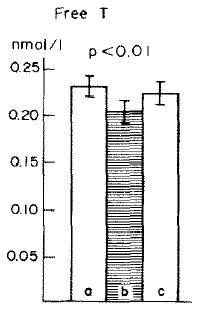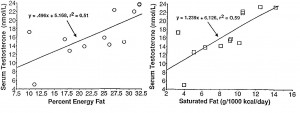It is known. Carbohydrate restriction improves (lowers) testosterone in women with PCOS. It works for men, too… but by “works” I mean “increases.”
Decrease of serum total and free testosterone during a low-fat high fibre diet (Hamalainen et al., 1982)
Intervention pseudo-crossover study: 30 healthy Finnish men in their 40’s were studied on their habitual high fat diet (40% fat), then put on a low-fat (25%) high fibre diet for 6 weeks, then switched back to high fat. The high fat diet was also higher in saturates, P:S ratio 0.15 vs. 1.25.
Free testosterone levels declined on the low fat diet, but they recovered after 6 weeks of going back to their high [saturated] fat dieting (p < 0.01).
Some observational data: Testosterone and cortisol in relationship to dietary nutrients and resistance exercise (Volek et al., 1997)
…fat, and in particular saturated fat, is associated with increased testosterone levels [in men]:
Off-topic (just came across this and felt like sharing): Effects of replacing meat with soyabean in the diet on sex hormone concentrations in healthy adult males (Habito et al., 2000)
42 healthy men aged 35-62 ate either 150 g meat or an equivalent amount of protein from tofu daily for 4 weeks, 2 week washout, then crossover.
Tofu reduced free testosterone (p=0.06) and increase estrogen (p=13)… testosterone:estrogen ratio reduced on tofu diet (p=0.06). Effects weren’t robust, but this is a crossover study. just sayin’
moving on: Body composition and hormonal responses to a carbohydrate-restricted diet (Volek et al., 2000)
12 healthy men switched from their habitual 48% carb diet to an 8% carb diet for 6 weeks. Protein intake increased from 113 to 176 g/d and fat intake nearly doubled, 32% to 61% with a lot of saturates. Dietary cholesterol also increased from 332 mg to 741 mg/d. A lot of dietary changes and predictable responses: 2 kg drop in body weight , 3 kg fat loss and 1 kg muscle gain… Insulin levels declined, and free testosterone increased from 0.48 to 0.53. No effect on total testosterone… increased dietary cholesterol –> increased testosterone? not in this study –> #SHBG.
but low carb ketogenic diets specifically reduce testosterone in PCOS…
Intensive insulin therapy increases sex hormone binding globulin in newly diagnosed type 2 diabetic patients (Tong et al., 2013)
Lower serum testosterone is independently associated with insulin resistance in non-diabetic older men: the Health In Men study (get it? H.I.M.) (Yeap et al., 2009)
In PCOS, hyperinsulinemia screws up GnRH secretion resulting in an exaggerated LH:FSH response… this increases ovarian androgen production, hirsutism. Men don’t have ovaries, and at least one study showed LH isn’t *directly* affected by insulin [in men] (Pesant et al., 2013)… (although this doesn’t rule out subtle changes in LH pulsatility or some other rarely measured parameter).
I suspect part of the effect [in men] is mediated by aromatase. The gyno might be permanent, but the loss of libido doesn’t have to be.
Cause or effect? The diet stuff (above) suggests diet-induced hormonal alterations are a part of the cause. Of course, it seems to work both ways: androgen deprivation therapy *causes* insulin resistance (Haidar 2007). Imho, however, in practice, diet should be at least considered because it’s an easy remedy: eat better.
@CaloriesProper @IanLane88 in a way e and t are opposite neg feedback regulators in men and women. They are byproduct of steroidogenesis.
— Jane Plain (Woo) (@ItsTheWooo) November 17, 2013




